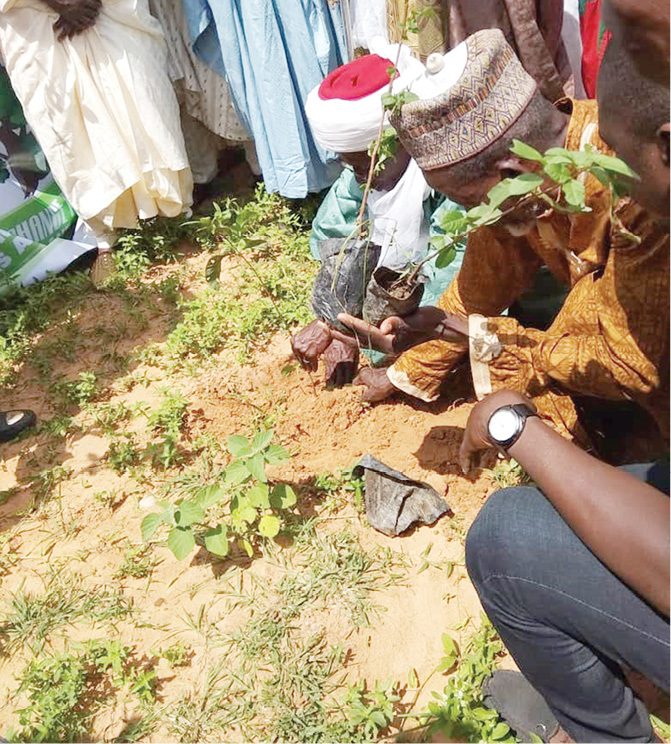Vulnerable households in Birnin Kebbi, Jega and Danko-Wasagu local government areas of Kebbi State are raising thousands of trees to help beat deforestation and climate change effect.
The communities received 268,000, out of 360,000 tree seedlings targeted for them to scale up afforestation and tackle environmental degradation in a campaign initiated by Oxfam to boost Kebbi’s forest cover.
The seedlings include those for economic trees such as Orange, Mango, Moringa, and Eucalyptus.
Oxfam and the Development Exchange Centre (DEC), with the support of the European Union, had embarked on tree planting campaign to sensitize the public on the need to plant trees to protect the environment.
At the launch of the ‘1 person, 4 trees’ campaign in Ambursa area of the state which Oxfam is implementing through PROACT project, District Head of Gwadanwaji in Birnin Kebbi local government area of Kebbi state, Umaru Ahmed said: “The importance of tree planting in Nigeria cannot be overemphasized. Desert encroachment is already threatening us, if we continue to play with it, it means serious problems for us.”
“If you watch the early beginning of the raining season, whenever you have a storm coming, you look at the amount of dust it brings about, severe winds precede each storm. If you have trees, they can stand as breaks against such disaster,” he said.
While noting that more than 70 per cent of Nigerians cooks with firewood, he said “It is the trees that are being eliminated day in day out so unless we plant more than we cut, we are just promoting the early speed of desert coming to overtake us.”
Speakin, the Oxfam Nigeria Governance Coordinator for the PROACT project in Adamawa and Kebbi states, Usman Faleye explains that all through the three years, the projects had been supporting communities with tree seedlings geared towards changing their behaviour and perception towards cutting down trees.
“Over the years, we have been giving them economic trees to grow in their farms and add to their asset. Imagine every individual try to grow one or four trees in their communities, we can start talking of afforestation rejuvenating in our communities across the country,” he said.
Faleye said: “We can’t quantify the damages that cutting down trees or climate change is bringing to our beneficiaries here so, we are trying to make them understand that this is very important to their own farming business. A whole lot of them suffer flood, gully erosion; tree supports all of this erosion mitigation from happening.”
While noting that recently Ethiopia planted more than 350 million trees in 12 hours, he said “We can do the same in Nigeria. Nigeria is an agrarian economy we are also pushing to see how well we can advance in our agricultural production, so the general message for everyone is we all need to start growing trees.”
Faleye noted that the Oxfam initiatives serve as a stimulus to the government on what they could do to tackle the situations, saying, they also influence and advocate local governments to also take tree planting seriously among other agricultural progressive things t they could do in their local government areas.
The Livelihood Programme Officer of PROACT Project Kebbi state, Enoch Bamaiyi said the problem is enormous and devastating.
“Imagine the hectares of land in Northern Nigerian and the level of desert encroachment. No one wants to live in a desert; everyone wants a fertile soil, a place where they can encourage farming, where people can get more food,” he said.
He points out: “If we want to fight deforestations and its attendant effect and also fight the problem of climate change, and even beat air pollution that every one of us is suffering from, we must all rise to the occasion and ensure we plant more trees, and save trees.”
One of the critical dangers of cutting down trees, he said, “is that it exposes the earth to erosion, drives climate change and the problem of global warming.”
He, however, observes in northern Nigeria, there were trees that are there sometimes in the past, but now they are no longer there, noting extinction of species of trees.
Bamaiyi noted that cutting down trees is reason for low rainfall and irregular rain pattern being experienced now, saying, more trees need to be planted to encourage carbon trapping, cool down environment and ensure that the problem of global warming is alleviated.

 Join Daily Trust WhatsApp Community For Quick Access To News and Happenings Around You.
Join Daily Trust WhatsApp Community For Quick Access To News and Happenings Around You.


